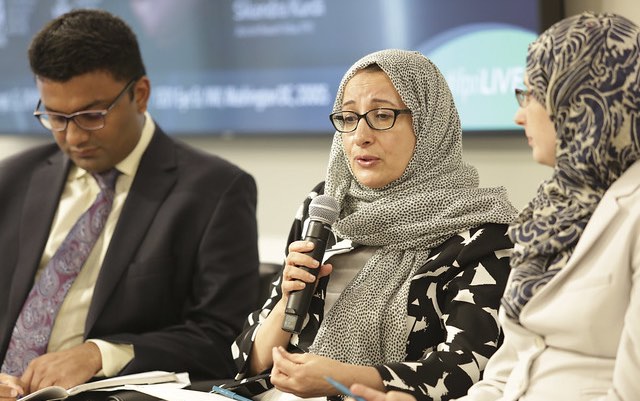The war in Yemen is an ongoing disaster for its people. Over 80% of the population currently requires humanitarian or protection assistance, making it the worst such crisis in the world, according to the UN Office for the Coordination of Humanitarian Affairs. With two thirds of all districts experiencing pre-famine conditions, and 20 million people food-insecure, the question of how best to deliver food assistance is paramount. A Sept. 5 IFPRI seminar explored the findings and implications of an IFPRI impact evaluation of Yemen’s Cash for Nutrition program, which provides cash transfers in combination with nutrition education for recipients.
“Conflict is now a major driver of food insecurity globally, and we’re interested in the impacts of cash transfers in conflict situations in particular, because it’s becoming an increasingly popular mode of humanitarian aid delivery,” said IFPRI Associate Research Fellow Sikandra Kurdi, one of the authors.
The evaluation reviewed the outcomes of a treatment group that received cash transfers, including food consumption and dietary diversity. It found that a large share of cash transfers were used for increased household food purchases. The treatment group, Kurdi explained, consumed more milk, eggs, fruits, and vegetables than control households. Thus, the combination of cash transfers with nutritional education has positive impacts on key measures of child and maternal nutrition.
The nutrition education component of the program stressed the importance of complementary feeding and animal source proteins for children, Kurdi added. This contributed to the program’s effectiveness, delivering significant impacts on dietary diversity and increases in nutritional outcomes for children. In addition, there were spillover impacts from those who learned from community health educators or training sessions, but were not a part of the group receiving cash transfers—suggesting that the impact of the results may be underestimated, Kurdi said, as demonstrated by improvements seen in behavioral outcomes even among households in the control group.
Given the sustained severity of Yemen’s conflict, many international organizations are on the ground there including the World Bank (WB). Its Yemen Emergency Crisis Response Project is a first for the organization, working in a country that is entirely in conflict, WB economist Yashodhan Ghorpade explained. The project focuses on partnerships with national institutions for sustained impact, including the Yemen Social Fund for Development (YSFD), Ghorpade said, whose neutrality and credibility, built over time, and stake in the country before and after conflict allows it to have an enduring presence—unlike a typical humanitarian intervention that may end once the crisis subsides.
He noted the reasons for the World Bank’s engagement: “Poverty is increasingly concentrated in fragile and conflicted countries, and its slowest face of decline is also in these countries, so if one wants to engage with the poverty reduction agenda, FCV [fragility, conflict, and violence] countries have to be central.” Working in such environments presents many challenges, he said, including safety, unclear governance structures, diversion of resources and corruption, the risk of creating future conflict, and questions on the sustainability of interventions.
YSFD Evaluation Manager Lamis Al-Iryani outlined some of the organization’s recent achievements, for example, more than 200,000 households have benefited from cash rewards since 2016. YSFD has also contributed to the empowerment of rural communities, including helping to establish more than 3,000 community-based organizations, employing more than 11,000 youth and 3,600 community educators.
While the impact evaluation produced positive findings overall, Dominique van de Walle, a Visiting Fellow at the Center for Global Development, commented on potential areas for improvement in future programs. Increasing the diversity of treatment households based on the degree to which they are affected by conflict is one area she noted. Separating the impacts of education vs. the impacts of the transfers could also further strengthen such evaluations, she said. The evaluation also could not answer the question of whether cash transfers or direct food aid is the superior form of assistance in humanitarian crises, she said, as there are many contributing factors—such as a functioning bank system—specific to this context.
“I think these kinds of programs that attempt to meet a specific need while associating with the various other elements of the humanitarian response are essential,” said Center for Strategic and International Studies Deputy Director and Senior Research Fellow Jacob Kurtzer. The Cash for Nutrition program addresses the whole spectrum of the humanitarian response (food, education, nutrition, and livelihoods), he said, despite specifically targeting nutrition.
Katarlah Taylor is an IFPRI Senior Events Specialist.







